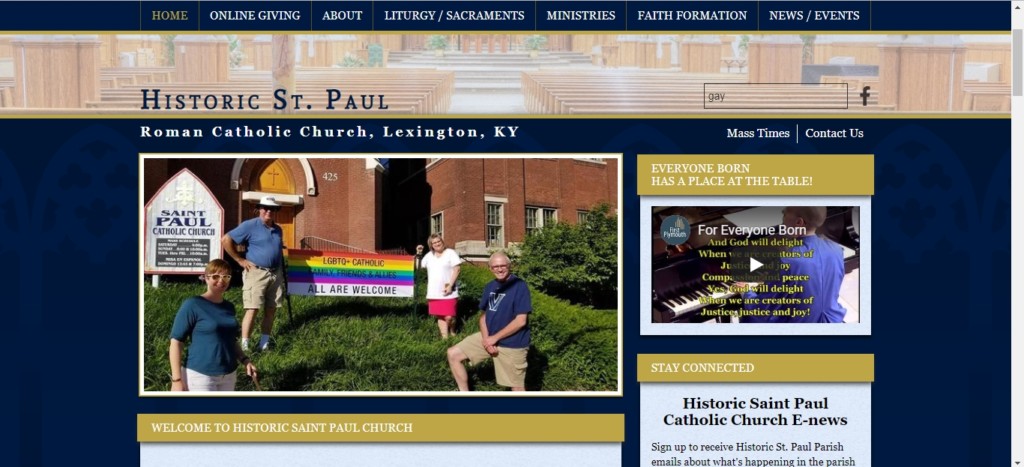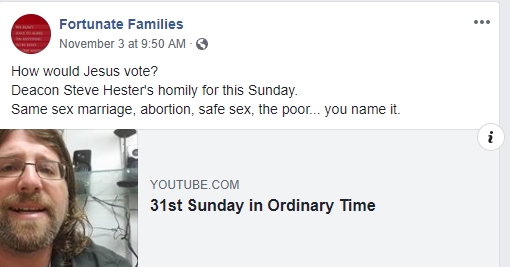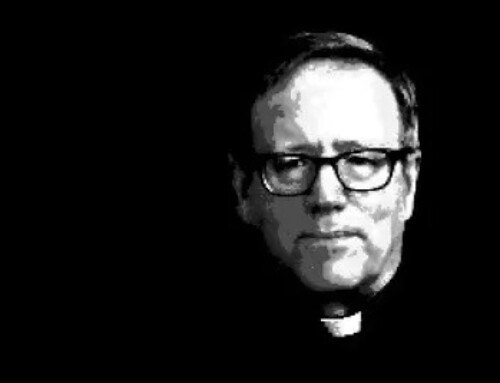(Above: Picture posted, June 23, 2018, to the official Facebook page of Fortunate Families.)
On November 3, 2018, the Catholic pro-gay marriage advocacy group Fortunate Families posted a link on their official Facebook page to Deacon Steve Hester’s homily for the 31st Sunday in Ordinary Time. Hester is a Deacon for the Diocese of Lexington at the Historic St. Paul Catholic Church in Lexington, Kentucky. Bishop John Stowe is listed as “Ecclesial Adviser” to the Lexington-based Fortunate Families and has celebrated mass for the group. The topic of Hester’s homily: “How Jesus would vote.” Hester begins by describing those topics which Jesus did not apparently address during His public ministry. Hester said:
Now Jesus didn’t preach against abortion at all. Now I don’t know why he didn’t. I don’t believe he thought killing babies was okay. And rest assured there was abortion back then. People have been figuring out how to end pregnancy early since they figured out what pregnancy was. So, it’s not as if he were unaware. But maybe he didn’t preach against abortion because he knew that safe sex and education rather than legislation are the actual way to reduce abortions. But he also knew that we wouldn’t end up believing in safe sex or education. So, it was a moot point. You’ll have to ask him when you get there.
And he didn’t preach against same-sex marriage or homosexuality either. Even though there were LGBT persons back then too. And maybe he didn’t preach against homosexuality because he was here to teach us how to love, not who to love. And when he did preach about marriage, it was to stress it’s permanence, it’s insolubility. He taught us how to love our partners for life, he didn’t teach us who those partners should be.
Hester then stated:
The things that Jesus talked about: immigration, health care, the poor, war and peace, and the ways he always preached about love tells us a lot about how he would probably vote.
On February 18, 2018, Fortunate Families posted to their Facebook page a series of photos and one short video taken at Saint Paul Catholic Church, which featured the First Sunday of Lent homily from Deacon Hester. They later added a YouTube video of the complete homily. The subject of his homily: the rainbow. In terms of the rainbow and its contemporary relationship to the LGBT community, Hester had this to say:
The pride flag that waves all over the world stands for community that values many of the same things that we value. Their flag stands for many of the same things that we stand for and I for one ‘m glad that somebody had the inspiration to use the symbol of God’s covenant in such a prominent way. To cover the world in rainbows.
In 2017, Bishop Stowe made the controversial decision to speak at New Way’s Ministry’s Eighth National Symposium held in Chicago, Illinois. The co-founders of New Ways Ministry were Sister Jeannine Gramick and Fr. Robert Nugent. In 1999, Nugent and Gramick were both officially censured by the Vatican and “permanently prohibited from any pastoral work involving homosexual persons.”
In 2010, Cardinal Francis George, O.M.I, Archbishop of Chicago and then-President of the United States Conference of Catholic Bishops, issued the following statement on the status of the organization “New Ways Ministry;” here is an excerpt:
No one should be misled by the claim that New Ways Ministry provides an authentic interpretation of Catholic teaching and an authentic Catholic pastoral practice. Their claim to be Catholic only confuses the faithful regarding the authentic teaching and ministry of the Church with respect to persons with a homosexual inclination.
Fortunate Families is a gay-affirmative pro-same-sex marriage advocacy group founded in 2004 by the Catholic parents of a “gay” son – Mary Ellen and Casey Lopata. Inspired by the work of Robert Nugent and Jeannine Gramick and their New Ways Ministry, the Lopata’s decided to form an outreach specifically targeted to the Catholic parents of LGBT children.
In 2003, the Lopatas published their book “Fortunate Families: Catholic Families with Lesbian Daughters and Gay Sons.” Here is an excerpt detailing their view of Scripture as it relates to homosexuality:
1. There are only six passages generally used to condemn homosexuality.
2. The primary concern of these passages is something other than homogenital activity.
3. There are translation issues suggested by the fact that 1946 was the first time the word “homosexual” appeared in an English translation.
4. The biblical writers had no concept of our modern psychological understanding of homosexual orientation.
5. The prophets, the gospels and Jesus say nothing about homosexuality in the bible.
According to Fortunate Families, their “Foundational Statement” includes:
We recognize that sometimes the conscience of the individual places him/her in conflict with articulated Catholic teaching. The resolution of this conflict often includes the proper use of conscience as articulated by the Magisterium. Many of us have sought the counsel of Catholic priests who have supported us in loving LGBTQ+ sisters and brothers…We realize that church teaching and the articulation of doctrine has developed through the years. We earnestly pray for a development of Church teaching on the topic of homosexuality and gender. We also earnestly pray that Church officials listen to our experiences and the experiences of our LGBTQ+ sisters and brothers.
According to Fortune Families:
We need to acknowledge that many of our LGBTQ+ sisters and brothers are in committed loving same gendered relationships. While same gendered relationships might not be procreative in the strict sense, they often are very generative, contribute to the common good, and can be examples of a loving, committed relationships. We ask the Church to acknowledge the truth of this.
In 2017, Jesuit priest James Martin recommended Fortunate Families. A member of Fortunate Families introduced Martin before his address at the 2018 Los Angeles Religious Education Congress.
During a June 8, 2017, Facebook Live event, James Martin answered questions from viewers about LGBT issues. One viewer asked him: How can one respond to persons citing Leviticus and Corinthians texts condemning homosexuality?”
Martin said: All these Bible passages that people throw at you; I think really need to be understood in their historical context. I mean Leviticus and Deuteronomy and even the stuff from the New Testament where Paul talks about it once or twice, has to be understood in their historical context…certainly in Old Testament times, they didn’t understand the phenomena of homosexuality and bisexuality as we do today.
In his long ministry, his three year public ministry, Jesus says nothing about the topic.
Archbishop Wilton Gregory has also shown support for an Atlanta-based offshoot of Fortunate Families; and a Catholic Deacon who spoke at a 2018 event sponsored by Fortunate Families, assisted Cardinal Kevin Farrell at the closing Mass of the Pastoral Congress portion of the 2018 World Meeting of Families in Dublin.
Contact the Diocese of Lexington.








Jesus had no need to speak to homosexuality. He spoke to a Jewish audience who were already aware of God’s condemnation of homosexual acts. (See Leviticus 18 & 20/) in the Old Testament. In the New Testament, read 1Corinthians 6:9-10 where St Paul speaking to pagans tells us abt all those who will not inherit the Kingom which in
includes sodomites. U r correct when u say Jesus loves gay ppl. Jesus loves everyone but u r in very serious error when u believe Jesus has no issue with homosexual acts. God’s commands do not evolve over time. They are constant.
Now it’s plain to see why we are in the situation we are in today….God help us
Joseph,
I see this deacon has been the subject on your blog before (back in Feb of 2018).
I have searched but could not find where this deacon went to seminary. Would you know, per chance?
Thanks and God bless,
Kevin
Christ said nothing about homosexuality — which meant He was leaving the religious teaching condemning homosexuality (as made clear in Leviticus and Deuteronomy) in place. Just as a lower court’s ruling is left in place when a higher court is silent on it.
True, He seemed to have lifted the death penalty for that sin (by lifting it for adultery in John 8, it’s safe to presume He was lifting it for other sexual sins as well). But like adultery, homosexuality is still a sin. Just like first-degree murder is still a crime even in a state that abolishes capital punishment.